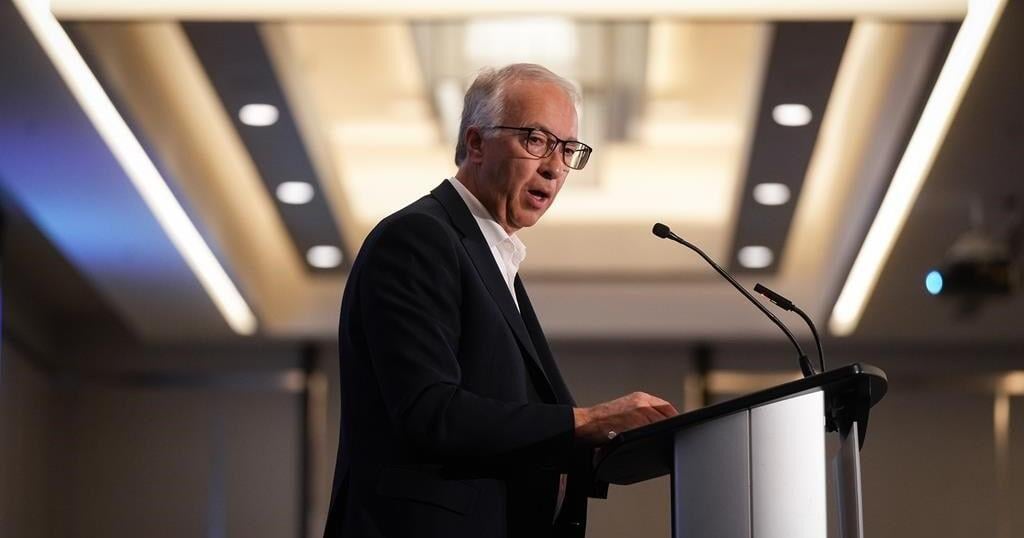The British Columbia’s New Democrats released the party’s platform Thursday days after the Greens unveiled a plan for government ahead of the election on Oct. 19.
The B.C. Conservative Party has not released its platform, but has made a series of policy announcements and promises as election day approaches.
Here is a look at some of the top promises made by each major party:
NDP
— Leader David Eby made perhaps the biggest promises in the fall campaign before it even began, promising that a re-elected NDP government would open involuntary-care facilities for those with overlapping addictions, mental illness, and brain injuries.
— Eby also promised that the NDP would scrap B.C.’s long-standing carbon tax if the federal government dropped its requirement for the tax, and would instead shift the burden to “big polluters.”
— On the campaign trail, Eby has promised that the NDP will exempt $10,000 of individual income from taxes every year, which translates to an annual tax reduction of about $1,000 for most households and $500 for individuals.
— Housing remains a central issue for the NDP, which vows to expand the existing speculation tax and prioritize building homes on public land, while also promising to eliminate no-pet clauses in purpose-built rentals.
— The NDP has promises to complete the SkyTrain line to Langley as well as move toward SkyTrain or light rail to the North Shore of Metro Vancouver. Free transit for seniors during off-peak hours is also pledged.
— The party pledges to freeze car insurance premiums that the NDP says have fallen 20 per cent annually due to changes made by Eby’s government.
—-
Conservatives
— One of B.C. Conservatives Leader John Rustad’s first announcements in the campaign was the “Rustad Rebate,” a plan to exempt $3,000 a month of rent or mortgage interest costs from income taxes, beginning with $1,500 monthly in the 2026 budget.
— Rustad has also promised to end the Insurance Corporation of B.C.’s “monopoly” on car insurance and open the market to other providers to lower prices for consumers.
— The Conservatives have touted energy independence as a goal if they are elected, which includes a feasibility study into nuclear power as a possible future source in a bid for “affordable” and “reliable” baseload electricity.
— Rustad promised to eliminate existing provincial mandates on electric vehicles and heat pumps and would only support alternative energy sources such as solar and wind when it makes “economical” sense.
— The Conservatives have made public safety a major battleground issue and tied it to B.C.’s drug-decriminalization policy, vowing to implement “zero-tolerance” for public drug use while increasing the police presence.
— The party has also put forward a plan for “economic reconciliation,” where Indigenous communities partner with the province to support projects with “both economic and environmental benefits.”
— The Conservatives say they will end bans on plastic straws and cutlery and remove compulsory fees for plastic bags in order to “restore freedom of choice and focus on real solutions for our environment.”
—-
Greens
— Green Leader Sonia Furstenau says her party’s platform is aimed at people’s “well-being” and includes a promise to create frameworks to measure B.C.’s social and environmental performance instead of using GDP as the standard measurement.
— Furstenau promised the Greens will address root causes of issues with long-term solutions, such as increasing social and disability insurance and “wraparound support” for youth aging out of care to combat poverty.
— A major part of the Green platform is promising to tax the wealthy, with proposals to double property tax rates for homes valued at $3 million or more and to implement an 18 per cent tax of corporate profits over $1 billion.
— In turn, the Greens promise to invest on a number of climate action, renewable energy and infrastructural fronts, including $650 million annually for municipal infrastructure to support new housing and $250 million to expand child care.
— The Greens have also promised a number of health-centric proposals, including removing all tobacco sales from pharmacies and making all vaccines free for B.C. residents.
— The party is the only one in the B.C. election pledging to maintain the carbon tax with or without federal mandates, and Furstenau has also vowed to “introduce a windfall profits tax on oil and gas companies,” and redirect revenue from industrial carbon pricing to fund community climate action.
This report by The Canadian Press was first published Oct. 3, 2024.
